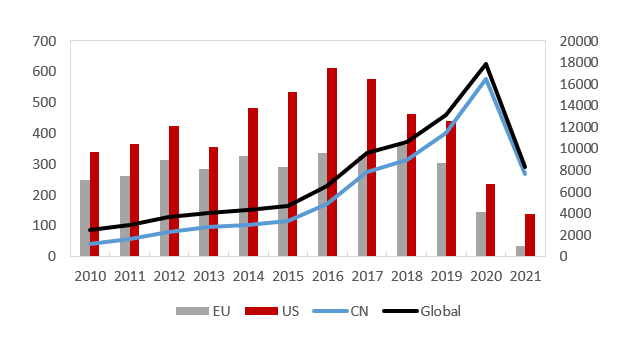Plastics have for years dominated the consumable materials market. With their low manufacturing costs and unique physical and chemical properties, they are perfect for achieving all kinds of innovations, which are often impossible with other materials. Global plastic production currently stands at >350 million tonnes, of which Europe accounts for 16%, the USA 19% and Asia 51%. Plastic production is estimated to double every 10 years and it is therefore important to be aware of the opportunities and risks involved in introducing innovation into the production and management of plastic waste. And all the more so as, to date, some 8.7 billion tonnes of this material have been produced.[i]
It is estimated that up to 79% of plastic products are currently at waste disposal sites and only 9% have so far been recycled. Not surprisingly, plastic waste accumulates rapidly in our surroundings with a number of negative effects, such as decreasing the viability of soil ecosystems and additionally putting our health and lives at risk. Estimates are that 11 million tonnes of plastic have so far ended up in the oceans alone.[ii] Although plastic itself is theoretically non-toxic because of its very high molecular weight and insolubility in water, this is not necessarily the case with a variety of additives or intermediates used.[iii] One particularly important fact, however, is that the slow decomposition of plastics results in the formation of very hazardous plastic microparticles, currently detected in more than 9% of the fish species tested in the North Pacific Ocean.[iv] They accumulate not only in ocean waters but also in other water bodies, in the air and in the soil, leading to increased biomagnification and negative health effects. Not to mention the fact that they are burnt at low temperatures (e.g. household burning furnaces), which causes release of carcinogenic and even endocrinally active dibenzyl-p-dioxins into the atmosphere and poses a serious risk.[v]
It is therefore no surprise that the EU (and a number of other organisations and initiatives) have taken measures to reduce plastic pollution (such as the European Green Deal strategy and restrictions on the use of certain plastics, especially those for single use). Awareness of what polluting our planet will entail encourages an unrestrained development of many innovations related to the problem of environmental pollution. In addition to ‘rationalising’ the use of plastics, numerous companies are now declaring that they will introduce environmentally friendly products and develop new ways of processing plastics. These actions, apart from leading to a significant increase in innovativeness of enterprises, build a positive image and trust among the society.
Major global companies are not indifferent to environmental issues and actively support a range of innovations by planning and implementing breakthroughs in their products. Paboco with its paper bottle or DEMETO with its innovative technology for the industrial application of chemical treatment of polyester waste are not the only ones worth mentioning. With the commitment of large corporations to the process of improving environmental protection, the changes that will take place may lead to major changes on the markets in the near future. Polish companies are not indifferent to the issue either.
The main strategies to tackle the polymer waste problem could include: recycling of waste (chemical and biological methods, processing of plastics into specific products), material recovery and plastic separation methods, alternative plastics such as bioplastics, etc. However, despite a number of regulations being introduced and media assurances, it is difficult to assess how the measures taken will affect the future of plastics management. In order to make a significant change in plastic emissions by 2030, a major effort is required, which seems hardly realistic. Mechanistic models in this area are unfortunately not very optimistic and, despite a number of measures taken, forecast a further significant increase in pollution.[vi] They show with clarity that an increase in waste management alone cannot counteract the growing problem. To contribute to reducing global plastic pollution levels, a fundamental transformation of plastics management is needed, preferably to a closed cycle model.
Global trends in the patent market as far as broadly understood plastic waste reduction is concerned, make it possible to identify areas where current efforts and funding are concentrated. They are at the same time an excellent guide as to which directions are worth pursuing.
The situation on the patent market with regard to broadly defined plastic waste reduction is very dynamic. The number of patent documents in the area of recycling technologies in the global market was increasing steadily until 2020, which was largely driven by the Chinese market (Fig. 1). In contrast, in both European and US markets, the number of documents in this area has been steadily declining since 2016. The pace of growth in areas focusing on the manufacture of bioplastics is quite different, and the use of, for example, self-regenerating, biocompatible and biodegradable materials can be seen as particularly interesting.

Fig. 1 Number of patent documents per year in markets responsible for 89% of global plastics production
[i] Geyer R et al. Sci Adv. 2017, 3, e1700782
[ii] https://earth.org/problems-plastic-pollution-creates-for-wildlife-in-the-ocean/
[iii] https://doi.org/10.1016/j.jhazmat.2017.10.014
[iv] Davison P, Asch RG (2011) Mar Ecol Prog Ser, 432:173-180
[v] Zdzisław Brzeski. “Medycyna Ogólna i Nauki o Zdrowiu”. 2011, 17, 161–164
[vi] Borrelle et al., Science 2020, 369, 1515–1518
Author Maciej Stodulski, PhD, Chemistry specialist; Patent Attorney trainee, JWP Patent & Trademark Attorneys
The article was published on March 10, 2022, in Polska Chemia magazine.


